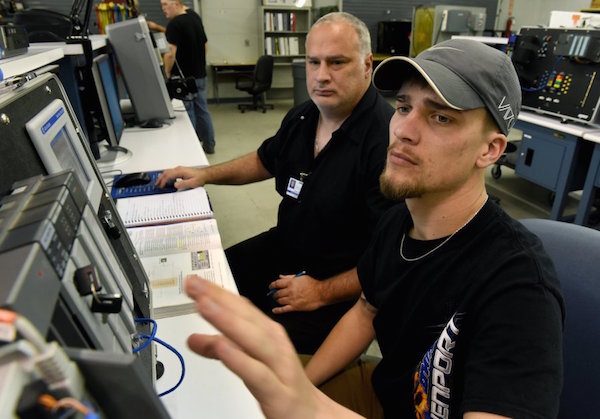
Tennessee Prepares for Loss of 1.4 Million Jobs to Automation
04/06/2016
While our hidebound representatives in Washington DC continue to ignore the technological revolution increasing in the nation’s workplaces, the political leaders in Tennessee are stepping up. The state government recognized the problem, studied it and finally created a policy response in the form of an educational program. The nation’s leaders should do half as well.
First, the bad news: 1.4 million Tennessee jobs, or around half of existing employment, are predicted to be lost to advancing juggernaut of robots, automation and software in the near future. That conclusion was published in the Tennessee Workforce Disruption Index, a project of a state economic research agency.
A Nashville report focused on the sorts of employment facing replacement as well as Tennessee’s skills-based retraining program: Report: Technology Threatens Jobs Of Tennesseans (March 21, 2016):
It’s good to see a state take the automation revolution seriously. In particular, Tennessee has set up its “Drive to 55” initiative which refers to the goal of raising the number of workers with post-secondary degrees from the current 37 percent to 55 percent by 2025.
Below, students learn skills suitable to the modern workplace at the Tennessee College of Applied Technology.

Still, the education solution may be only temporary in the coming techno-future as smart machines advance in abilities. Tech entrepreneur Vivek Wadhwa observed in a 2014 Washington Post piece: “ … at best we have another 10 to 15 years in which there is a role for humans” (We’re heading into a jobless future, no matter what the government does).
Martin Ford, the author of Rise of the Robots: Technology and the Threat of a Jobless Future was similarly cautionary about education as the panacea during a September radio interview in Australia:
So these technologies are coming after the skilled jobs, the good jobs, the jobs that college graduates might want to take and really kind of upends this conventional view that the solution to all of this is more education.You know, the idea that if you lose your low skilled job then we’ll send you back to school and give you some more training so that you can move up the skills ladder. That’s looking like it may not work so well because the technology is also coming after those skilled jobs.
At least Tennessee is engaged and facing the future, which is more than you can say for Washington. That place still can’t find the OFF switch for immigration, even when it’s clear that importing more foreign workers is ill-advised given employment’s shrinking future. Enlarging the angry underclass of poor is unwise and can only lead to more misery.
Remember: Automation makes immigration obsolete.
Here’s a local report of Tennessee’s grappling with the automation behemoth:
Robots taking over? Half of Tennessee jobs at risk due to automation, state report says, Nashville Business Blog, March 21, 2016About 50 percent of Tennessee jobs, some 1.4 million, could be replaced by robots, automation and advanced technology in the near future, according to a new study from the state’s economic development department.
That’s the crux of a new report by the Center for Economic Research in Tennessee, which explores the impact automation and technological disruption may have on the state’s workforce in the years ahead.
The study notes that 1.4 million workers have a high likelihood of being displaced by automation — a total that represents 37 percent of the wages among Tennessean workers.
Exposure to these potential losses varies by region and county. The report finds Davidson and Williamson counties are the least vulnerable to disruption from job automation.
Lower-wage occupations are more vulnerable to replacement, the report finds. The Center for Economic Research identifies office and administrative support jobs such as office clerks, bookkeepers, accountants and administrative assistants on the list. The report also says a body of production and transportation jobs also are susceptible, among others.
There is a significant caveat to all of this research, however. The report notes that “automation can complement labor to improve productivity and incomes.” At least one white paper done by the Association for Advance Automation concludes that the more robots there are in the workforce, the more jobs are created.
The biggest takeaway from the center’s report: Higher skills among the workforce may help lessen the severity of potential job losses. Additionally, automation of jobs stands to create new job opportunities in the future.
The report identifies the need to double down on higher education initiatives such as the Tennessee Promise, which offers two years of free technical or community college degrees to qualifying high school graduates, and Tennessee Reconnect, which encourages residents to go back to school and get postsecondary degrees.
“Education, innovation and other characteristics of a community’s workforce may prepare the population to complement and take advantage of automation,” according to the research center’s report. “Increased education will allow Tennessee to adapt and capitalize on the opportunities presented by workplace automation.”
“Human capital development is necessary for economic growth,” the report states. “Jobs requiring higher education are less susceptible to automation; higher education translate to higher earnings; and therefore a sufficiently educated workforce is essential for regional economic growth.”
Additionally, robots and automation may not be a zero-sum negative for workers or the state’s economy. There’s also the possibility of more employers setting up shop in the Volunteer State, for many of the same reasons companies continue to invest here.
The report notes that “automation could lead to the ‘reshoring’ or manufacturing supply chains closer to home in critical geographical hubs,” adding that “Tennessee could have an infrastructural advantage … [because] of its central location.”
